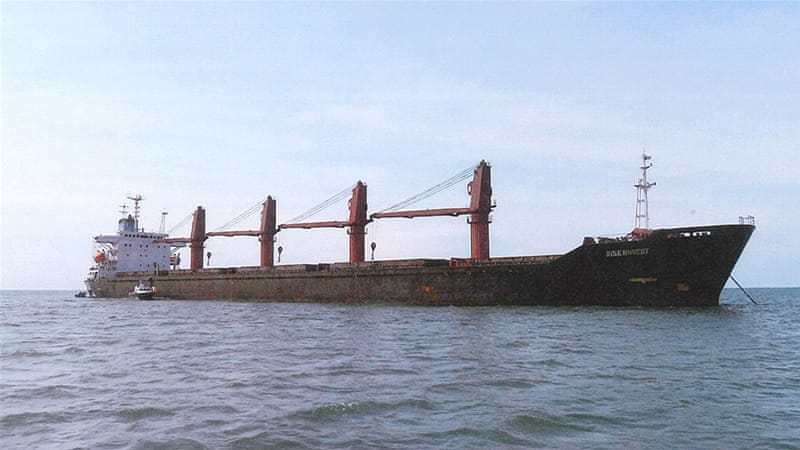US seizes North Korean coal vessel accused of violating sanctions
US officials allege the ‘Wise Honest’ vessel violated US and UN sanctions by illicitly shipping coal from North Korea.
In an unusual civil forfeiture action, the US Department of Justice announced on Thursday it has seized a major cargo vessel belonging to North Korea known as the “Wise Honest”, which officials allege violated United States and United Nations sanctions by illicitly shipping coal from North Korea.
The ship, which was first confiscated by other foreign maritime authorities in Indonesia in April 2018, is now in US possession and is currently approaching US territorial waters, a Justice Department official said.
The 17,061-tonne ship, which was also used to deliver heavy machinery to North Korea, is one of the country’s largest bulk carriers, the Justice Department said.
The case marks the first time the US has seized a North Korean cargo vessel for violating sanctions.
“Our office uncovered North Korea’s scheme to export tonnes of high-grade coal to foreign buyers by concealing the origin of their ship, the Wise Honest,” US lawyer Geoffrey Berman said in a statement.
“This scheme not only allowed North Korea to evade sanctions, but the Wise Honest was also used to import heavy machinery to North Korea,” Berman added.
According to UN sanctions monitors, the Wise Honest was transporting 25,500 tonnes of coal when it was detained by Indonesia in April 2018.
The UN report estimated that the value of the ship’s coal cargo was around three million dollars.
“This sanctions-busting ship is now out of service,” John Demers, the head of the Justice Department’s National Security Division, said in a statement.
North Korea did not immediately comment on the seizure.
Delicate moment
The announcement of the seizure comes at a delicate moment between the two countries. Hours earlier, North Korea fired two suspected short-range missiles in an apparent sign of trouble for nuclear disarmament talks.
The two missiles were fired from the northwest area of Kusong, in an easterly direction, South Korea’s Joint Chiefs of Staff said in a statement.
They came less than a week after North Korea’s leader Kim Jong Un oversaw the test-firing of multiple rockets and a missile.
Analysts said it was too soon to say exactly what kind of missiles they were after flying about 420km and 270km before crashing into the sea.
South Korean President Moon Jae-in said the tests seemed to be a protest by North Korea after Kim and US President Donald Trump failed to reach agreement on Pyongyang’s nuclear weapons and missile arsenal at a February summit in Vietnam.
Analysts have warned if the North returns to the kind of longer-range banned weapons it tested in 2017, it will be a strong sign that a frustrated North Korea is turning away from diplomacy.
Trump told reporters on Thursday he knows North Korea wants to negotiate with the US, but that he does not think it is ready to do so.
“The relationship continues … I know they want to negotiate, they’re talking about negotiating. But I don’t think they’re ready to negotiate,” Trump told reporters at the White House. He said “nobody is happy” about North Korea’s latest missile launch.
US Secretary of State Mike Pompeo, who earlier cut short a European trip to return to Washington for meetings on Iran, was also due to have discussions on North Korea after learning of the launches, a senior US State Department official said.
Pompeo was due to meet on Thursday with Japan’s Chief Cabinet Secretary Yoshihide Suga, who is expected to raise Japanese Prime Minister Shinzo Abe’s hopes to set up a summit with Kim.
Weekend tests
On Saturday, North Korea launched multiple rockets and at least one short-range ballistic missile.
That was North Korea’s first test of a ballistic missile since launching an intercontinental ballistic missile in November 2017 and sharply raising tension at a time of stalemate in its talks with the US.
This week, North Korea lashed out at the US and South Korea, saying the weekend launches were “regular and self-defensive” and rejecting the notion that they were provocative. It criticised Seoul and Washington for carrying out military drills.
Trump and his administration played down the weekend tests, and in a Twitter message on Saturday, the US president said he was still confident he could reach a deal with Kim.
Trump has previously held up a freeze in missile testing since 2017 as evidence of progress with North Korea, while he and Pompeo have brushed aside Kim’s demand for Washington to show more flexibility in nuclear talks by the year-end.
In 2017, after North Korea tested its most powerful intercontinental ballistic missile (ICBM) – which it said was capable of delivering a warhead to anywhere in the US – Kim declared his nuclear force complete. He then extended an olive branch to Seoul and Washington, holding two summits with Trump and three with the South Korean president.
A North Korean media report on Wednesday had hinted at the more tests, saying, “The South Korean military were astonished by the recent strike drill. It might fall into a swoon to see a strike drill involving more powerful cutting-edge weapons.”
Source: Read Full Article



